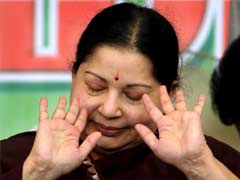
J Jayalalithaa's lawyers have said they will move the Supreme Court against her bail plea being rejected on Tuesday by the Karnataka High Court. The former Tamil Nadu chief minister has been in jail for 10 days now, after being convicted and arrested in a corruption case.
Here are the latest developments:
The High Court rejected bail even though the public prosecutor had said he had no objection to Ms Jayalalithaa being granted conditional bail.
Justice AV Chandrashekhara said in a packed courtroom that there "are no grounds" to give bail to the AIADMK chief and observed, "Corruption is seen as a violation of human rights of all." (Read)
He also noted that the Supreme Court has sent out a clear message that corruption cases should be put on the fast track.
Scenes of celebration outside the Bangalore court and at Ms Jayalalithaa's Chennai residence as television channels reported that the prosecution had said it had no objections to conditional bail, soon gave way to tears and hysteria when the court's verdict was delivered.
O Panneerselvam, Ms Jayalalithaa's loyalist now serving as Chief Minister of Tamil Nadu, has urged her supporters to stay peaceful. There have been widespread protests against her conviction. "Keeping calm is the only way to express love for Jayalalithaa," the new Chief Minister said.
Ms Jayalalithaa, 66, says she has wrongly been convicted of misusing her first term as chief minister from 1991 to 1996 to collect assets worth nearly Rs. 50 crore, which were not commensurate with her declared income.
She was arrested after being convicted on September 27 by a Bangalore court and was sentenced to four years in prison. She has also been fined Rs. 100 crore; three of her aides, including live-in friend Sasikala Natarajan were also found guilty.
Ms Jayalalithaa appealed against her conviction and asked for bail. She was represented in the High Court by famous lawyer Ram Jethmalani, who did not seek bail on grounds of Ms Jayalalithaa's health. He argued on technical points, citing precedent in past cases and even quoted Oscar Wilde.
Her trial was moved in 2001 to neighbouring Karnataka from Tamil Nadu to ensure it would be free of political influence.
Ms Jayalalithaa's conviction meant that as per last year's landmark Supreme Court order, she was immediately disqualified from office. Tamil Nadu votes for a new government in 2016 and if her conviction is not set aside, Ms Jayalalithaa will not be able to contest.

